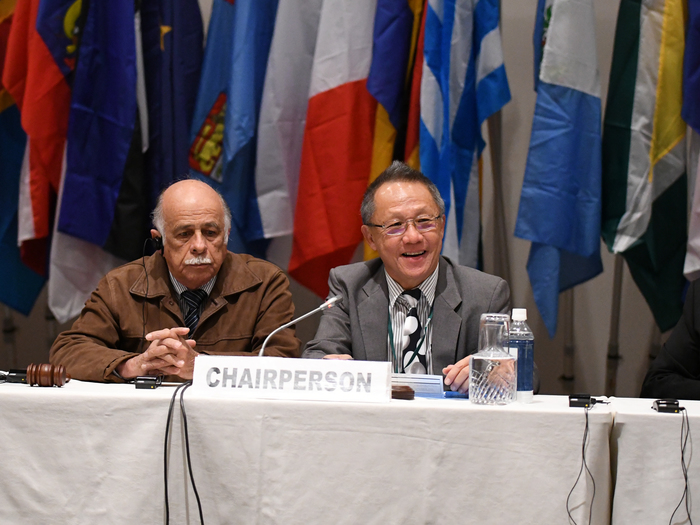ITTO is the world’s premier organization on tropical forestry and trade and must continue to function, according to the Trade Advisory Group. In a statement issued at the conclusion of the 2016 Annual Market Discussion, held in Yokohama on 9 November 2016 as part of the 52nd Session of the International Tropical Timber Council, the Trade Advisory Group urged members and stakeholders to “close ranks and rebuild this organization”.
TAG was established to provide inputs to ITTO's policy and project work. It is open to anyone with an interest in the tropical timber trade, including representatives of tropical forest industries, timber exporters and importers, timber trade and industry consultants, and trade and industry associations.
The statement, which was presented by TAG co-chair, Barney Chan, set out the following three key ways in which ITTO differs from and has a much bigger impact than other similar organizations, which “we in the private sector see as the winning difference”, according to the TAG statement.
First, ITTO does not preach or set out prescriptions on forest management. Rather, it works with members to develop guidelines that members then test in the field. ITTO works with member countries on ITTO-funded projects according to these accepted guidelines.
Second, ITTO provides a fair and level playing field for all stakeholders to interact. Within the Organization, non-governmental organizations, including environmental organizations, have a platform to discuss and work with the private sector on matters of importance to both parties—good forest management.
“This interaction is key to finding solutions that are not only successful on the ground but that can endure over time,” said the TAG statement.
Third, ITTO delivers market intelligence through its Market Information Service reports, which go to a very wide international audience twice a month.
The reports, which provide continuous updates on trends, prices, trade news, production and exports, “is deeply appreciated by the trade around the world,” said the TAG statement. “No other international organization provides such a valuable, transparent service.”
In view of the recent severe financial setback to ITTO, said the statement, “we in TAG want to work closely with ITTO members to move our organization forward beyond this crisis”. The TAG statement said that, together, the Council and the Secretariat were “a formidable force that has and can continue to help shape the future of tropical forest management and trade”.
The TAG statement can be obtained here.
The theme of the Annual Market Discussion at this session was on the challenges and opportunities posed and presented by free-trade agreements (FTAs) for the tropical timber trade. The discussion came as results of the presidential election in the United States of America were coming to hand.
“The TPP [Trans-Pacific Partnership] is now done in the US, at least for the near term,” said Joe O’Donnell, Senior Manager for Government and Public Affairs at the International Wood Products Association (IWPA), United States of America. He indicated that the election result would likely have impacts on the trade environment in his country but that the IWPA was committed to working to keep trade flows open.
Enrique Tellez Pacheco, President of the National Chamber of Wood Industry in Mexico, said that Mexico had recently signed new bilateral FTAs with Japan, Peru, Central America and Panama, and others—including the TTP. These could provide new export and import opportunities for tropical timber, he said, but support was needed to develop local industries. Otherwise, FTAs would exacerbate the issue of exporting low-value-added raw materials and then importing finished products made using those same raw materials.
“Trade agreements can be a powerful tool to boost the trade of legal tropical timber,” said Erick Fisher, President of the Forestry Committee of the Peruvian Association of Exporters. But this was not being achieved in Peru, he said, because the diagnosis of the problem and actions to address it had focused primarily on illegal logging and its associated trade. These actions, were insufficient “to guarantee the sustainability of tropical forests”.
According to André de Boer, Secretary General of the European Timber Trade Federation, there had been a dramatic decrease in imports of tropical timber in Europe due to the financial crisis there and the poor image of tropical timber.
“But we are now coming out of the crisis,” he said. “It is time to fight for market share for tropical timber, and legality and sustainability are the keys in Europe.”
Other speakers at the Annual Market Discussion were Jirawat Tangkijngamwong, Chairman of the Thai Timber Association, and Labode Popoola, Professor of Forest Economics/Sustainable Development at the University of Ibadan, Nigeria.
The presentations made at the Annual Market Discussion are available here.
ITTC-52 Banner

